#Lesser-Known Facts
Explore tagged Tumblr posts
Text
Unveiling the Enigma: 15 Surprising Facts About Tony Bennett, King of the American Songbook

View On WordPress
#American Songbook icon#Iconic Performer#Jazz Singer#Lesser-Known Facts#Music Legend#Musical Genius#Surprising Details#Tony Bennett biography#Tony Bennett discography#Tony Bennett facts#Tony Bennett influence on music#Tony Bennett jazz singer#Tony Bennett Legacy#Tony Bennett lesser-known facts#Tony Bennett life and legacy#Tony Bennett music legend#Tony Bennett musical achievements#Tony Bennett songs#Tony Bennett surprising details#Tony Bennett Tribute#Tony Bennett tribute concert#Tony Bennett&039;s musical journey
2 notes
·
View notes
Video
youtube
बिल्लियों के बारे में #रोचक #तथ्य #फैक्ट्स #interestingfacts #hindi
बिल्लियों के बारे में #रोचक #तथ्य #फैक्ट्स #interestingfacts #hindi #cat #cats #cutecat #cutecats #hindifacts #HindiMedia #hindime #hindimefacts #funfacts #india #Indian https://youtu.be/bWd7meHSZAo via @YouTube
#youtube#Hindi#Facts#Interesting Facts#Amazing Facts#Unknown Facts#Lesser Known Facts#Lesser-known facts#knowledge#trivia
0 notes
Text
fun fact: today most people probably think that calling the nameless protagonist of a Beauty and the Beast adaptation 'Belle' comes from the Disney movie, but it actually happens because the 1946 movie by Jean Cocteau was so beloved and influential everyone else just carried it forward
#follow for comics meta stay for fairy tale fun facts. I have so many of them#(yes TECHNICALLY 'Beauty' had been called Belle in some lesser-known variants before. but the 1946 movie had an OUTSIZED impact)#fairy tales#beauty and the beast#la belle et la bête
976 notes
·
View notes
Text
Jealous Jellybean Gale

(Gif & screenshots from videos posted by YouTube users _shhennanigans_, ValeEntertainment, and Kimberism)
So, everyone’s favorite flirty Gale dialogue (where Gale says he ‘appreciates your musk’, etc) happens at the Tiefling party if Tav’s already done the Weave scene and started romancing him before the party begins.
But there’s a different dialogue you’ll get at the Tiefling party IF Gale’s approval gets high enough for the Weave scene to occur there, AND Tav flirts with another companion before speaking to him.
I myself have never gotten this because I speed run romancing this man & get the Weave scene ASAP every time like the simp I am. In fact, I’ve only found three videos which show this jealous dialogue because it does seem to be pretty rare.
First, it starts off the same as when Tav approaches him at the party without having flirted with anyone else:

If Tav DIDN’T flirt with anyone else, Gale will tell you to see him later, after the revelry has ended, in more ‘intimate surrounds.’ (This will be the Weave scene that we’re all familiar with.)
But, if Tav successfully flirted with someone else, Gale will know and he will be a SMIDGE JELLY:

And he’ll even throw some personalized shade depending on which companion Tav got cozy with:


Note: I scoured YouTube to see if I could find his comments on Lae’zel, Karlach or Wyll, but I cannot find anything! If anyone knows what he says about them I’d love to hear it.
Regardless, he ends on the same line:

And I have to say that, for as much as I love sweet, kind, romantic Gale and I tend to focus on that aspect of him, I DO appreciate seeing scenes of him being flawed and imperfect and real in his emotions.
Is he being a jerk here? Yes. Is it because he is so down bad for Tav that he’s drowning his sorrows in wine and his tongue has loosened too much? Also yes.
You get a full set of dialogue options to choose from, which all have Gale reacting in a unique, tipsy, but overall sweet manner (especially #5, because that’s what he was hoping Tav would say.)

To see each of his responses, watch the full video below from Kimberism:
youtube
Whatever you do—don’t judge him too harshly. After all, if Tav ultimately picks someone else, he respects their choice. But for now, while he still has a chance:

That’s our Gale 💜
#Your weekly installment of Overly-Detailed Lesser-Known Fun Facts About Gale©️ has arrived!#Curious to see how many people already knew about this#Entirely possible I’m the only one who was unaware lmao#gale dekarios#gale of waterdeep#baldur’s gate 3#bg3
285 notes
·
View notes
Text

#Presenting Three of Napoleon’s Lesser-Known Blunders#Napoleon Bonaparte#Napoleon#France#French history#facts#trivia#mustard#mayonnaise#computers#Sea World#seals
112 notes
·
View notes
Text


reibert x sanrio ⭐❤️
#bertholdt deserves to have a sanrio partner and i'm correct for thinking that#hoshinowaguma is one of the lesser known sanrio characters but i think he's so cutie#he lives on a moon and his favorite hobby is traveling to diff constellations..... enough#plus hes blue and a bear so. bertholdt coded i think#bear-tholdt even#also i just know they bond over their long ass names#anyway. they are now very dear to me#plus the fact that reiner has my melody whos pink.... enough of this madness#bertholdt hoover#reiner braun#reibert#hoshinowaguma#my melody#sanrio#aot#terra art
134 notes
·
View notes
Text

A Yorse in your yard? Its more likely than you think! Really loved making this (incredibly cracked) ko-fi request for @notoftheskaal - thank you very much for your support, and for making me draw this haha!
(My links and my ko-fi, should you wish!)
#there was never a day that I thought I'd unironically draw Yorse#but that day has arrived#let it be known that this was actually the lesser cursed of the two sketches I did#that's right I did in fact also draw THAT Yorse#Maybe one day it will be forced to see the light of day#but for now you get Centaur Yorse#featuring Gambol and Shroud as totally normal horses in the bg#you're welcome - or I'm sorry#depends on how this makes you feel#rwby#bumbleby#yang xiao long#blake belladonna#yorse#kofi request#artist on kofi#rwby fanart#temp tats art
60 notes
·
View notes
Text

January Featured Ship: Cody/Echo/Fives/Rex
Cody appearances: The Clone Wars (2003, 2008), Revenge of the Sith
Echo, Fives, Rex appearances: The Clone Wars (2008)
Group Appearances:
The Clone Wars: Rookies, ARC Troopers, The Citadel, Counterattack
The ship: Cody and Rex are the ones who find Echo and Fives on the Rishi moon, and are shown to care about them a great deal in all subsequent appearances, while Echo and Fives move from starry eyed enthusiasm to equal respect and affection.
#clonecest#cloneshiprarepair2025#cloneshipping#cody/echo/fives/rex#the plan is to get these posts out earlier next month#admittedly part of the goal with them is to help folks understand lesser known characters on this list#and these four probably need the least help of anyone#but also please use the notes on these posts for planning or offering ideas or sharing fun facts to inspire others!#this is your warning to never ever say you'll do something tomorrow publicly on the internet for you will get a migraine instead#this one also did not have a pitch so we tried to summarize it in one sentence
27 notes
·
View notes
Text

i feel like this is one part of Light's plan that a lot of people overlook when considering Mello's intentions in kidnapping Takada, but in my opinion, it's the one major clue that indicates what he could have been thinking. Light deliberately had Mikami "kill" someone in front of Gevanni so that Near would believe the notebook was real. i couldn't find it stated anywhere, but i believe it's meant to be implied that Mikami talking to himself about the Shinigami was also deliberate - hence why he was obvious enough about it that Rester could lip-read. either way, there was definitely at least one obvious clue that Near and his team missed.
we know for a fact that Lidner fed back all the information about Near's investigation except Mikami's identity, which would include details like Mikami killing someone in public and openly talking about the Shinigami to seemingly no one. so, we know that Mello is well aware of this. Near made an error on the basis that he was too focused on confirming what he already suspected (Mikami's identity as X-Kira) and finalising the details of his ending plan. a piece of evidence such as Mikami using the notebook in public would, to him, be viewed as validation of his deductions, not as new insight to be critically analysed on its own. Mello, on the other hand, did not have this same preoccupation.
Mello had much less personal investment in Light and Near's plans, and much less on his plate without as many eyes looking to him for answers. all he had to focus on was the information he was provided with at any given time. this gives him ample opportunity to consider the facts from an objective point of view, and put the pieces together sometime between December 21st (the day Mikami killed someone in front of Gevanni) and January 25th (the day he announced to Lidner "i guess i'm going to have to do it"). it gives him ample opportunity, too, to realise that the only way to expose the true location of the notebook is for someone to throw themselves into the firing line. his name is already out there, which makes him the perfect candidate.
there's one last piece of evidence that confirms it for me:

THIS line in particular is what seals the deal. we know for a fact that Mello and Near are designed to be the two halves of L. Near says it himself - he and Mello were not capable enough to surpass L on their own, but together, they could. it makes the most sense that Near's win would be the product of Mello catching an error that he couldn't. Near missed this crucial detail by himself, but L as a collective noticed it, because Mello is just as much a part of L as Near is.
#i've talked about this before but i still feel like it's a lesser known fact???#or at least. not one i've ever seen anyone else mention here as far as i can recall#mello#mihael keehl#analyses#long post
55 notes
·
View notes
Text
James Gunn can you shut up about Batman for one fucking second in your interviews ur making me nervous to trust you with the big namers like Superman
#james gunn#batman#superman#dc comics#apart from the fact that he completely invalidated adoptees in an interview by calling Damian the ‘only real son’#it feels like he might be pushing for a too edgy Batman#he said Batman wouldn’t be campy like sir. Batman is a serious character but you gotta acknowledge he is campy#I do think he’s a better option than Snyder but Gunn’s strengths lie in lesser known characters#he’s great at bringing the little guy to the front#but I’m terrified for the Superman movie if this is how he talks about Batman
18 notes
·
View notes
Text
SEND ME AN ASK STATING AN ANIMAL OR MULTIPLE AND ILL GIVE YOU EVERY FUN FACT I HAVE OR FIND ABOUT THEM AND I KNOW ALOTTTTTTTTTTT LIKE I COULD TEACH AN ENTIRE CLASS AND STILL HAVE MORE MY ADHD IS INSANE !!!!

#animal#animals#fun facts#fun animal facts#adhd#hyperfixation#animal facts#asks open#send asks#ask blog#please#I really wanna share my facts#lmao#it can be literally anything#any animal that exists#ESPECIALLY THE LESSER KNOWN ONES#MAYBE ILL EVEN MAKE LITTLE DOODLES OF THEM FOR THE ASKS#not every time tho#but if I wanna lol#I PROMISE I HAVE REALLY GOOD FACTS LIKE ONES THAT WILL MAKE UR FACE LOOK LIKE THIS#🤯#k I love u my stars 🌟#starspeakz#I fucking love this gif
8 notes
·
View notes
Text
I’m going to dinner tonight with my friend and her parents and my friend claims that her dad is a bigger Beatles fan than me - what are some obscure facts about the Beatles I can whip out to prove I am the supreme fan????
102 notes
·
View notes
Note
2 things:
assuming etc/etcs are one of your sets of pronouns (im like 75% sure im reading it right) HI!!! i use et/cetera so it's. slightly different but YAY a fellow user of sort-of-the-same-pronouns
is there anywhere you recommend starting with regards to like. understanding kondraki lore
YES THAT IS RIGHT!!!!! thats so awesomeeee we love seeing ppl w/ similar pronouns .:33!!
hmm,, in regards to UNDERSTANDING kondrakis lore, not really! as per most scp lore its all a mishmash of misc tales and (usually one-sentence) appearances in actual scp articles, BUT!!!!!!! we recommend starting at scp-408*(***) (*just for general lore reasons, shes very tied to the swarm**(*408) so its good to read up on them first .:3) (***there's another version to 408, 7408, which i ALSO recommend as that one is slightly more popular. 7408 is what newer fans refer to when they talk about her swarm ^_^) and then just kind of reading other tales featuring her .:3. her lore isnt actually all that complicated compared to most doctors so its fairly easy to figure out by just reading a couple tales involving her .:-D
#anyway. grins smiles we're always open 2 answering questions abt her if u need clarification for literally anything .:3333#<- living encyclopedia for this one fucking dude in specific#(NOTE SHE ALSO HAS. A TUMBLR BLOG .:3333. its literally just @kondraki lol. its an IN CHARACTER rp/askblog run by her author!!!#its inactive now as her author up and left the internet lol but STILL. genuinely amazing source of fun konny facts + she talks about -#- misc stuff that isnt really featured in tales or scps there* (*like her childhood and her connections to her coworkers ^_^)#so it acts as a really great resource if you wanna get into like. her headspace & just generally know some lesser known facts abt her .:3!)#scp.doc#inbox#txt
11 notes
·
View notes
Text

Fun Fox Fact This is the Corsac Fox, or just the Corsac. It's native to the Steppe of Central Asia!
14 notes
·
View notes
Text
The division between the two families [the Woodvilles and the Nevilles] and their allies can be seen in the royal charters that they witnessed. Warwick, Rivers and Archbishop Neville of York, while serving as chancellor and afterwards, were fairly constant witnesses to royal charters and consequently often appeared together. This was not, however, the case for other family members and friends. From 1466 to 1469, if Scales or Woodville associates like Sir John Fogge, John Lord Audley or Humphrey Lord Stafford of Southwick witnessed royal charters, then members of the Neville group, such as John Neville, earl of Northumberland, or John Lord Wenlock would not, and vice versa. Discounting the ubiquitous Warwick, Rivers and Archbishop Neville, of the twenty-four charters issued between February 1466 and June 1469, twelve were witnessed by men associated with the Woodvilles, eight by men associated with the Nevilles and two were witnessed by no member of either group beyond the two earls at their heads and the archbishop; only two charters, both from 1466, featured associates of both families.
Such striking segregation of witnesses suggests that something more than simple convenience or availability was at play. [...] The evidence of these witness lists does show the extent of the split between the two groups from early in Edward's reign and of the need for political society to work with that cleavage in the heart of the Yorkist regime.
— Theron Westervelt, "Royal charter witness lists and the politics of the reign of Edward IV"
*This is specifically applicable for Edward IV's first reign; in contrast, the charters in his second reign displayed a great deal of aristocratic and domestic unity and cohesion.
#the woodvilles#edward iv#wars of the roses#richard neville 16th earl of warwick#my post#elizabeth woodville#Obviously I hate the idea of Elizabeth and her family being seen as a social-climbing invasive species who banished the old nobility and#drove Warwick/Richard into rebellion and dominated the government and controlled the king and were responsible for Everything Wrong Ever#but I also dislike the 'revisionist' idea that they were ACTUALLY just passive and powerless bystanders or pawns who kept to their#social “place” (whatever the fuck that means). Frankly speaking this is more of a diminishment than a realistic defense.#the 'Queen's kin' (as they were known at the time) were very visible at court and demonstrably influential and prominent in politics#and as this shows there DOES seem to have been a genuine division/conflict between them and the Nevilles during Edward's first reign#(which DID directly lead to the decline of Neville dominance in England though the maintained honored positions and influence of their own)#Especially since Edward's second reign was entirely void of any such divisions - instead the nobility were united and focused on the King#even Clarence and Gloucester's long and disruptive quarrel over the Warwick inheritance never visibly left its mark on charters#so the Woodville/Neville divide from the 1460s must have been very sharp and divisive indeed#And yes it's safe to say that Elizabeth Woodville was probably involved: whether in her own right or via support of her family - or both -#it's illogical to argue that she was uninvolved (even the supportive Croyland Chronicle writes that Edward was “too greatly influenced”#by her; she and her family worked together across the 1470s; she was the de-facto head in 1483; etc)#Enhanced by the fact that Elizabeth was the first Englishwoman to be crowned queen - meaning that the involvement of her#homeborn family marked the beginning of “a new and largely unprecedented factor in the English power structure” (Laynesmith)#This should be kept in mind when it comes to analyzing contemporary views of them and of Elizabeth's own anomalous position#HOWEVER understanding the complexity of the situation at hand doesn't mean accepting the traditionally vilified depiction of the Woodvilles#Warwick and the Nevilles remained empowered and (at least outwardly) respected by the regime#Whether he was driven by disagreements over foreign policy or jealousy or ambition - the decision to rebel was very much his own#Claiming that the Woodvilles were primarily responsible is ridiculous (and most of the nobility continued to support Edward regardless)#There's also the fact that Warwick took what was probably a basic factional divide and turned it into a misogynistic and classist narrative#of a transgressive “bad” woman who became queen through witchcraft and aggrandized a family of social-climbing “lessers” who replaced#the inherently more deserving old nobility and corrupted the realm - later revived and intensified by Richard III a decade later#ie: We can recognize their genuine division AND question the (false/unfair) problematic narrative around the Woodvilles. Nuance is the key.
14 notes
·
View notes
Text
Twelve, Thirteen, and One
Words: 6k
Rating: G
Themes: Friendship, Self-Giving Love
(Written for the Four Loves Fairytale Retelling Challenge over at the @inklings-challenge! A Cinderella retelling feat. curious critters and a lot of friendship.)
When the clock chimes midnight on that third evening, thirteen creatures look to the girl who showed them all kindness.
—
It’s hours after dark, again, and the human girl still sleeps in the ashes.
The mice notice this—though it happens so often that they’ve ceased to pay attention to her. She smells like everything else in the hearth: ashy and overworked, tinged with the faint smell of herbs from the kitchen.
When she moves or shifts in her sleep (uncomfortable sleep—even they can sense the exhaustion in her posture as she sits slumped against the wall, more willing to seep up warmth from the stone than lie cold elsewhere this time of year), they simply scurry around her and continue combing for crumbs and seeds. They’d found a feast of lentils scattered about once, and many other times, the girl had beckoned them softly to her hand, where she’d held a little chunk of brown bread.
Tonight, she has nothing. They don’t mind—though three of them still come to sniff her limp hand where it lies drooped against the side of her tattered dress.
A fourth one places a little clawed hand on the side of her finger, leaning over it to investigate her palm for any sign of food.
When she stirs, it’s to the sensation of a furry brown mouse sitting in her palm.
It can feel the flickering of her muscles as she wakes—feeling slowly returning to her body. To her credit, she cracks her eyes open and merely observes it.
They’re all but tame by now. The Harsh-Mistress and the Shrieking-Girl and the Angry-Girl are to be avoided like the plague never was, but this girl—the Cinder-Girl, they think of her—is gentle and kind.
Even as she shifts a bit and they hear the dull crack of her joints, they’re too busy to mind. Some finding a few buried peas (there were always some peas or lentils still hidden here, if they looked carefully), some giving themselves an impromptu bath to wash off the dust. The one sitting on her hand is doing the latter, fur fluffed up as it scratches one ear and then scrubs tirelessly over its face with both paws.
One looks up from where it’s discovered a stray pea to check her expression.
A warm little smile has crept up her face, weary and dirty and sore as she seems to be. She stays very still in her awkward half-curl against stone, watching the mouse in her hand groom itself. The tender look about her far overwhelms—melts, even—the traces of tension in her tired limbs.
Very slowly, so much so that they really aren’t bothered by it, she raises her spare hand and begins lightly smearing the soot away from her eyes with the back of her wrist.
The mouse in her palm gives her an odd look for the movement, but has discovered her skin is warmer than the cold stone floor or the ash around the dying fire. It pads around in a circle once, then nudges its nose against her calloused skin, settling down for a moment.
The Cinder-Girl has closed her eyes again, and drops her other hand into her lap, slumping further against the wall. Her smile has grown even warmer, if sadder.
They decide she’s quite safe. Very friendly.
—
The old rat makes his rounds at the usual times of night, shuffling through a passage that leads from the ground all the way up to the attic.
When both gold sticks on the clocks’ moonlike faces point upward, there’s a faint chime from the tower-clock downstairs. He used to worry that the sound would rouse the humans. Now, he ignores it and goes about his business.
There’s a great treasury of old straw in the attic. It’s inside a large sack—and while this one doesn’t have corn or wheat like the ones near the kitchen sometimes do, he knows how to chew it open all the same.
The girl sleeps on this sack of straw, though she doesn’t seem to mind what he takes from it. There’s enough more of it to fill a hundred rat’s nests, so he supposes she doesn’t feel the difference.
Tonight, though—perhaps he’s a bit too loud in his chewing and tearing. The girl sits up slowly in bed, and he stiffens, teeth still sunk into a bit of the fabric.
“Oh.” says the girl. She smiles—and though the expression should seem threatening, all pulled mouth-corners and teeth, he feels the gentleness in her posture and wonders at novel thoughts of differing body languages. “Hello again. Do you need more straw?”
He isn’t sure what the sounds mean, but they remind him of the soft whuffles and squeaks of his siblings when they were small. Inquisitive, unafraid. Not direct or confrontational.
She’s seemed safe enough so far—almost like the woman in white and silver-gold he’s seen here sometimes, marveling at his own confidence in her safeness—so he does what signals not-afraid the best to his kind. He glances her over, twitches his whiskers briefly, and goes back to what he was doing.
Some of the straw is too big and rough, some too small and fine. He scratches a bundle out into a pile so he can shuffle through it. It’s true he doesn’t need much, but the chill of winter hasn’t left the world yet.
The girl laughs. The sound is soft and small. It reminds him again of young, friendly, peaceable.
“Take as much as you need,” she whispers. Her movements are unassuming when she reaches for something on the old wooden crate she uses as a bedside table. With something in hand, she leans against the wall her bed is a tunnel’s-width from, and offers him what she holds. “Would you like this?”
He peers at it in the dark, whiskers twitching. His eyesight isn’t the best, so he finds himself drawing closer to sniff at what she has.
It’s a feather. White and curled a bit, like the goose-down he’d once pulled out the corner of a spare pillow long ago. Soft and long, fluffy and warm.
He touches his nose to it—then, with a glance upward at her softly-smiling face, takes it in his teeth.
It makes him look like he has a mustache, and is a bit too big to fit through his hole easily. The girl giggles behind him as he leaves.
—
There’s a human out in the gardens again. Which is strange—this is a place for lizards, maybe birds and certainly bugs. Not for people, in his opinion. She’s not dressed in venomous bright colors like the other humans often are, but neither does she stay to the manicured garden path the way they do.
She doesn’t smell like unnatural rotten roses, either. A welcome change from having to dart for cover at not just the motions, but the stenches that accompany the others that appear from time to time.
This human is behind the border-shubs, beating an ornate rug that hangs over the fence with a home-tied broom. Huge clouds of dust shake from it with each hit, settling in a thin film on the leaves and grass around her.
She stops for a moment to press her palm to her forehead, then turns over her shoulder and coughs into her arm.
When she begins again, it’s with a sharp WHOP.
He jumps a bit, but only on instinct. However—
A few feet from where he settles back atop the sunning-rock, there’s a scuffle and a sharp splash. Then thrashing—waster swashing about with little churns and splishes.
It’s not the way of lizards to think of doing anything when one falls into the water. There were several basins for fish and to catch water off the roof for the garden—they simply had to not fall into them, not drown. There was little recourse for if they did. What could another lizard do, really? Fall in after them? Best to let them try to climb out if they could.
The girl hears the splashing. She stares at the water pot for a moment.
Then, she places her broom carefully on the ground and comes closer.
Closer. His heart speeds up. He skitters to the safety of a plant with low-hanging leaves—
—and then watches as she walks past his hiding place, peers into the basin, and reaches in.
Her hand comes up dripping wet, a very startled lizard still as a statue clinging to her fingers.
“Are you the same one I always find here?” she asks with a chiding little smile. “Or do all of you enjoy swimming?”
When she places her hand on the soft spring grass, the lizard darts off of it and into the underbrush. It doesn’t go as far as it could, though—something about this girl makes both of them want to stand still and wait for what she’ll do next.
The girl just watches it go. She lets out a strange sound—a weary laugh, perhaps—and turns back to her peculiar chore.
—
A song trails through the old house—under the floorboards—through the walls—into the garden, beneath the undergrowth—and lures them out of hiding.
It isn’t an audible song, not like that of the birds in the summer trees or the ashen-girl murmuring beautiful sounds to herself in the lonely hours. This one was silent. Yet, it reached deep down into their souls and said come out, please—the one who helped you needs your help.
It didn’t require any thought, no more than eat or sleep or run did.
In chains of silver and grey, all the mice who hear it converge, twenty-four tiny feet pattering along the wood in the walls. The rat joins them, but they are not afraid.
When they emerge from a hole out into the open air, the soft slip-slap of more feet surround them. Six lizards scurry from the bushes, some gleaming wet as if they’d just escaped the water trough or run through the birdbath themselves.
As a strange little hoard, they approach the kind girl. Beside her is a tall woman wearing white and silver and gold.
The girl—holding a large, round pumpkin—looks surprised to see them here. The woman is smiling.
“Set the pumpkin on the drive,” the woman says, a soft gleam in her eye. “The rest of you, line up, please.”
Bemused, but with a heartbeat fast enough for them to notice, the girl gingerly places the pumpkin on the stone of the drive. It’s natural for them, somehow, to follow—the mice line in pairs in front of it, the rat hops on top of it, and the lizards all stand beside.
“What are they doing?” asks the girl—and there’s curiosity and gingerness in her tone, like she doesn’t believe such a sight is wrong, but is worried it might be.
The older woman laughs kindly, and a feeling like blinking hard comes over the world.
It’s then—then, in that flash of darkness that turns to dazzling light, that something about them changes.
“Oh!” exclaims the girl, and they open their eyes. “Oh! They’re—“
They’re different.
The mice aren’t mice at all—and suddenly they wonder if they ever were, or if it was an odd dream.
They’re horses, steel grey and sleek-haired with with silky brown manes and tails. Their harnesses are ornate and stylish, their hooves polished and dark.
Instead of a rat, there’s a stout man in fine livery, with whiskers dark and smart as ever. He wears a fine cap with a familiar white feather, and the gleam in his eye is surprised.
“Well,” he says, examining his hands and the cuffs of his sleeves, “I suppose I won’t be wanting for adventure now.”
Instead of six lizards, six footmen stand at attention, their ivory jackets shining in the late afternoon sun.
The girl herself is different, though she’s still human—her hair is done up beautifully in the latest fashion, and instead of tattered grey she wears a shimmering dress of lovely pale green, inlaid with a design that only on close inspection is flowers.
“They are under your charge, now,” says the woman in white, stepping back and folding her hands together. “It is your responsibility to return before the clock strikes midnight—when that happens, the magic will be undone. Understood?”
“Yes,” says the girl breathlessly. She stares at them as if she’s been given the most priceless gift in all the world. “Oh, thank you.”
—
The castle is decorated brilliantly. Flowery garlands hang from every parapet, beautiful vines sprawling against walls and over archways as they climb. Dozens of picturesque lanterns hang from the walls, ready to be lit once the sky grows dark.
“It’s been so long since I’ve seen the castle,” the girl says, standing one step out of the carriage and looking so awed she seems happy not to go any further. “Father and I used to drive by it sometimes. But it never looked so lovely as this.”
“Shall we accompany you in, milady?” asks one of the footmen. They’re all nearly identical, though this one has freckles where he once had dark flecks in his scales.
She hesitates for only a moment, looking up at the pinnacles of the castle towers. Then, she shakes her head, and turns to look at them all with a smile like the sun.
“I think I’ll go in myself,” she says. “I’m not sure what is custom. But thank you—thank you so very much.”
And so they watch her go—stepping carefully in her radiant dress that looked lovelier than any queen’s.
Though she was not royal, it seemed there was no doubt in anyone’s minds that she was. The guards posted at the door opened it for her without question.
With a last smile over her shoulder, she stepped inside.
—
He's straightening the horses' trappings for the fifth time when the doors to the castle open, and out hurries a figure. It takes him a moment to recognize her, garbed in rich fabrics and cloaked in shadows, but it's the girl, rushing out to the gilded carriage. A footman steps forward and offers her a hand, which she accepts gratefully as she steps up into the seat.
“Enjoyable evening, milady?” asks the coachman. His whiskers are raised above the corners of his mouth, and his twinkling eyes crinkle at the edges.
“Yes, quite, thank you!” she breathes in a single huff. She smooths her dress the best she can before looking at him with some urgency. “The clock just struck quarter till—will you be able to get us home?”
The gentle woman in white had said they only would remain in such states until midnight. How long was it until the middle of night? What was a quarter? Surely darkness would last for far more hours than it had already—it couldn’t be close. Yet it seemed as though it must be; the princesslike girl in the carriage sounded worried it would catch them at any moment.
“I will do all I can,” he promises, and with a sharp rap of the reins, they’re off at a swift pace.
They arrive with minutes to spare. He knows this because after she helps him down from the carriage (...wait. That should have been the other way around! He makes mental note for next time: it should be him helping her down. If he can manage it. She’s fast), she takes one of those minutes to show him how his new pocketwatch works.
He’s fascinated already. There’s a part of him that wonders if he’ll remember how to tell time when he’s a rat again—or will this, all of this, be forgotten?
The woman in white is there beside the drive, and she’s already smiling. A knowing gleam lights her eye.
“Well, how was the ball?” she asks, as Cinder-Girl turns to face her with the most elated expression. “I hear the prince is looking for fair maidens. Did he speak with you?”
The girl rushes to grasp the woman’s hands in hers, clasping them gratefully and beaming up at her.
“It was lovely! I’ve never seen anything so lovely,” she all but gushes, her smile brighter and broader than they’d ever seen it. “The castle is beautiful; it feels so alive and warm. And yes, I met the Prince—although hush, he certainly isn’t looking for me—he’s so kind. I very much enjoyed speaking with him. He asked me to dance, too; I had as wonderful a time as he seemed to. Thank you! Thank you dearly.”
The woman laughs gently. It isn’t a laugh one would describe as warm, but neither is it cold in the sense some laughs can be—it's soft and beautiful, almost crystalline.
“That’s wonderful. Now, up to bed! You’ve made it before midnight, but your sisters will be returning soon.”
“Yes! Of course,” she replies eagerly—turning to smile gratefully at coachman and stroke the nearest horses on their noses and shoulders, then curtsy to the footmen. “Thank you all, very much. I could not ask for a more lovely company.”
It’s a strange moment when all of their new hearts swell with warmth and affection for this girl—and then the world darkens and lightens so quickly they feel as though they’ve fallen asleep and woken up.
They’re them again—six mice, six lizards, a rat, and a pumpkin. And a tattered gray dress.
“Please, would you let me go again tomorrow? The ball will last three days. I had such a wonderful time.”
“Come,” the woman said simply, “and place the pumpkin beneath the bushes.”
The woman in white led the way back to the house, followed by an air-footed girl and a train of tiny critters. There was another silent song in the air, and they thought perhaps the girl could hear it too: one that said yes—but get to bed!
—
The second evening, when the door of the house thuds shut and the hoofsteps of the family’s carriage fade out of hearing, the rat peeks out of a hole in the kitchen corner to see the Cinder-Girl leap to her feet.
She leans close to the window and watched for more minutes than he quite understands—or maybe he does; it was good to be sure all cats had left before coming out into the open—and then runs with a spring in her step to the back door near the kitchen.
Ever so faintly, like music, the woman’s laughter echoes faintly from outside. Drawn to it like he had been drawn to the silent song, the rat scurries back through the labyrinth of the walls.
When he hurries out onto the lawn, the mice and lizards are already there, looking up at the two humans expectantly. This time, the Cinder-Girl looks at them and smiles broadly.
“Hello, all. So—how do you do it?” she asks the woman. Her eyes shine with eager curiosity. “I had no idea you could do such a thing. How does it work?”
The woman fixes her with a look of fond mock-sternness. “If I were to explain to you the details of how, I’d have to tell you why and whom, and you’d be here long enough to miss the royal ball.” She waves her hands she speaks. “And then you’d be very much in trouble for knowing far more than you ought.”
The rat misses the girl’s response, because the world blinks again—and now all of them once again are different. Limbs are long and slender, paws are hooves with silver shoes or feet in polished boots.
The mouse-horses mouth at their bits as they glance back at the carriage and the assortment of humans now standing by it. The footmen are dressed in deep navy this time, and the girl wears a dress as blue as the summer sky, adorned with brilliant silver stars.
“Remember—“ says the woman, watching fondly as the Cinder-Girl steps into the carriage in a whorl of beautiful silk. “Return before midnight, before the magic disappears.”
“Yes, Godmother,” she calls, voice even more joyful than the previous night. “Thank you!”
—
The castle is just as glorious as before—and the crowd within it has grown. Noblemen and women, royals and servants, and the prince himself all mill about in the grand ballroom.
He’s unsure of the etiquette, but it seems best for her not to enter alone. Once he escorts her in, the coachman bows and watches for a moment—the crowd is hushed again, taken by her beauty and how important they think her to be—and then returns to the carriage outside.
He isn’t required in the ballroom for much of the night—but he tends to the horses and checks his pocketwatch studiously, everything in him wishing to be the best coachman that ever once was a rat.
Perhaps that wouldn’t be hard. He’d raise the bar, then. The best coachman that ever drove for a princess.
Because that was what she was—or, that was what he heard dozens of hushed whispers about once she’d entered the ball. Every noble and royal and servant saw her and deemed her a grand princess nobody knew from a land far away. The prince himself stared at her in a marveling way that indicated he thought no differently.
It was a thing more wondrous than he had practice thinking. If a mouse could become a horse or a rat could become a coachman, couldn’t a kitchen-girl become a princess?
The answer was yes, it seemed—perhaps in more ways than one.
She had rushed out with surprising grace just before midnight. They took off quickly, and she kept looking back toward the castle door, as if worried—but she was smiling.
“Did you know the Prince is very nice?” she asks once they’re safely home, and she’s stepped down (drat) without help again. The woman in white stands on her same place beside the drive, and when Cinder-Girl sees her, she waves with dainty grace that clearly holds a vibrant energy and sheer thankfulness behind it. “I’ve never known what it felt like to be understood. He thinks like I do.”
“How is that?” asks the woman, quirking an amused brow. “And if I might ask, how do you know?”
“Because he mentions things first.” The girl tries to smother some of the wideness of her smile, but can’t quite do so. “And I've shared his thoughts for a long time. That he loves his father, and thinks oranges and citrons are nice for festivities especially, and that he’s always wanted to go out someday and do something new.”
—
The third evening, the clouds were dense and a few droplets of rain splattered the carriage as they arrived.
“Looks like rain, milady,” said the coachman as she disembarked to stand on water-spotted stone. “If it doesn’t blow by, we’ll come for ye at the steps, if it pleases you.”
“Certainly—thank you,” she replies, all gleaming eyes and barely-smothered smiles. How her excitement to come can increase is beyond them—but she seems more so with each night that passes.
She has hardly turned to head for the door when a smattering of rain drizzles heavily on them all. She flinches slightly, already running her palms over the skirt of her dress to rub out the spots of water.
Her golden dress glisters even in the cloudy light, and doesn’t seem to show the spots much. Still, it’s hardy an ideal thing.
“One of you hold the parasol—quick about it, now—and escort her inside,” the coachman says quickly. The nearest footman jumps into action, hop-reaching into the carriage and falling back down with the umbrella in hand, unfolding it as he lands. “Wait about in case she needs anything.”
The parasol is small and not meant for this sort of weather, but it's enough for the moment. The pair of them dash for the door, the horses chomping and stamping behind them until they’re driven beneath the bows of a huge tree.
The footman knows his duty the way a lizard knows to run from danger. He achieves it the same way—by slipping off to become invisible, melting into the many people who stood against the golden walls.
From there, he watches.
It’s so strange to see the way the prince and their princess gravitate to each other. The prince’s attention seems impossible to drag away from her, though not for many’s lack of trying.
Likewise—more so than he would have thought, though perhaps he’s a bit slow in noticing—her focus is wholly on the prince for long minutes at a time.
Her attention is always divided a bit whenever she admires the interior of the castle, the many people and glamorous dresses in the crowd, the vibrant tables of food. It’s all very new to her, and he’s not certain it doesn’t show. But the Prince seems enamored by her delight in everything—if he thinks it odd, he certainly doesn’t let on.
They talk and laugh and sample fine foods and talk to other guests together, then they turn their heads toward where the musicians are starting up and smile softly when they meet each other’s eyes. The Prince offers a hand, which is accepted and clasped gleefully.
Then, they dance.
Their motions are so smooth and light-footed that many of the crowd forgo dancing, because admiring them is more enjoyable. They’re in-sync, back and forth like slow ripples on a pond. They sometimes look around them—but not often, especially compared to how long they gaze at each other with poorly-veiled, elated smiles.
The night whirls on in flares of gold tulle and maroon velvet, ivory, carnelian, and emerald silks, the crowd a nonstop blur of color.
(Color. New to him, that. Improved vision was wonderful.)
The clock strikes eleven, but there’s still time, and he’s fairly certain he won’t be able to convince the girl to leave anytime before midnight draws near.
He was a lizard until very recently. He’s not the best at judging time, yet. Midnight does draw near, but he’s not sure he understands how near.
The clock doesn’t quite say up-up. So he still has time. When the rain drums ceaselessly outside, he darts out and runs in a well-practiced way to find their carriage.
—
Another of the footmen comes in quickly, having been sent in a rush by the coachman, who had tried to keep his pocketwatch dry just a bit too long. He’s soaking wet from the downpour when he steps close enough to get her attention.
She sees him, notices this, and—with a glimmer of recognition and amusement in her eyes—laughs softly into her hand.
ONE—TWO— the clock starts. His heart speeds up terribly, and his skin feels cold. He suddenly craves a sunny rock.
“Um,” he begins awkwardly. Lizards didn’t have much in the way of a vocal language. He bows quickly, and water drips off his face and hat and onto the floor. “The chimes, milady.”
THREE—FOUR—
Perhaps she thought it was only eleven. Her face pales. “Oh.”
FIVE—SIX—
Like a deer, she leaps from the prince’s side and only manages a stumbling, backward stride as she curtsies in an attempt at a polite goodbye.
“Thank you, I must go—“ she says, and then she’s racing alongside the footman as fast as they both can go. The crowd parts for them just enough, amidst loud murmurs of surprise.
SEVEN—EIGHT—
“Wait!” calls the prince, but they don’t. Which hopefully isn’t grounds for arrest, the footman idly thinks.
They burst through the door and out into the open air.
NINE—TEN—
It has been storming. The rain is crashing down in torrents—the walkways and steps are flooded with a firm rush of water.
She steps in a crevice she couldn’t see, the water washes over her feet, and she stumbles, slipping right out of one shoe. There’s noise at the door behind them, so she doesn’t stop or even hesitate. She runs at a hobble and all but dives through the open carriage door. The awaiting footman quickly closes it, and they’re all grasping quickly to their riding-places at the corners of the vehicle.
ELEVEN—
A flash of lightning coats the horses in white, despite the dark water that’s soaked into their coats, and with a crack of the rains and thunder they take off at a swift run.
There’s shouting behind them—the prince—as people run out and call to the departing princess.
TWELVE.
Mist swallows them up, so thick they can’t hear or see the castle, but the horses know the way.
The castle’s clock tower must have been ever-so-slightly fast. (Does magic tell truer time?) Their escape works for a few thundering strides down the invisible, cloud-drenched road—until true midnight strikes a few moments later.
—
She walks home in the rain and fog, following a white pinprick of light she can guess the source of—all the while carrying a hollow pumpkin full of lizards, with an apron pocket full of mice and a rat perched on her shoulder.
It’s quite the walk.
—
The prince makes a declaration so grand that the mice do not understand it. The rat—a bit different now—tells them most things are that way to mice, but he’s glad to explain.
The prince wants to find the girl who wore the golden slipper left on the steps, he relates. He doesn’t want to ask any other to marry him, he loved her company so.
The mice think that’s a bit silly. Concerning, even. What if he does find her? There won’t be anyone to secretly leave seeds in the ashes or sneak them bread crusts when no humans are looking.
The rat thinks they’re being silly and that they’ve become too dependent on handouts. Back in his day, rodents worked for their food. Chewing open a bag of seed was an honest day’s work for its wages.
Besides, he confides, as he looks again out the peep-hole they’ve discovered in the floor trim of the parlor. You’re being self-interested, if you ask me. Don’t you want our princess to find a good mate, and live somewhere spacious and comfortable, free of human-cats, where she’d finally have plenty to eat?
It’s hard to make a mouse look appropriately chastised, but that question comes close. They shuffle back a bit to let him look out at the strange proceedings in the parlor again.
There are many humans there. The Harsh-Mistress stands tall and rigid at the back of one of the parlor chairs, exchanging curt words with a strange man in fine clothes with a funny hat. Shrieking-Girl and Angry-Girl stand close, scoffing and laughing, looking appalled.
Cinder-Girl sits on the chair that’s been pulled to the middle of the room. She extends her foot toward a strange golden object on a large cushion.
The shoe, the rat notes so the mice can follow. They can’t quite see it from here—poor eyesight and all.
Of course, the girl’s foot fits perfectly well into her own shoe. They all saw that coming.
Evidently, the humans did not. There’s absolute uproar.
“There is no possible way she’s the princess you’re looking for!” declares Harsh-Mistress, her voice full of rage. “She’s a kitchen maid. Nothing royal about her.”
“How dare you!” Angry-Girl rages. “Why does it fit you? Why not us?”
“You sneak!” shrieks none other than Shrieking-Girl. “Mother, she snuck to the ball! She must have used magic, somehow! Princes won’t marry sneaks, will they?”
“I think they might,” says a calm voice from the doorway, and the uproar stops immediately.
The Prince steps in. He stares at Cinder-Girl.
She stares back. Her face is still smudged with soot, and her dress is her old one, gray and tattered. The golden slipper gleams on her foot, having fit as only something molded or magic could.
A blush colors her face beneath the ash and she leaps up to do courtesy. “Your Highness.”
The Prince glances at the messenger-man with the slipper-pillow and the funny hat. The man nods seriously.
The Prince blinks at this, as if he wasn’t really asking anything with his look—it’s already clear he recognizes her—and meets Cinder-Girl’s gaze with a smile. It’s the same half-nervous, half-attemptingly-charming smile as he kept giving her at the ball.
He bows to her and offers a hand. (The rat has to push three mice out of the way to maintain his view.)
“It’s my honor,” he assures her. “Would you do me the great honor of accompanying me to the castle? I’d had a question in mind, but it seems there are—“ he glances at Harsh-Mistress, who looks like a very upset rat in a mousetrap. “—situations we might discuss remedying. You’d be a most welcome guest in my father’s house, if you’d be amenable to it?”
It’s all so much more strange and unusual than anything the creatures of the house are used to seeing. They almost don’t hear it, at first—that silent song.
It grows stronger, though, and they turn their heads toward it with an odd hope in their hearts.
—
The ride to the castle is almost as strange as that prior walk back. The reasons for this are such:
One—their princess is riding in their golden carriage alongside the prince, and their chatter and awkward laughter fills the surrounding spring air. They have a good feeling about the prince, now, if they didn’t already. He can certainly take things in stride, and he is no respecter of persons. He seems just as elated to be by her side as he was at the ball, even with the added surprise of where she'd come from.
Two—they have been transformed again, and the woman in white has asked them a single question: Would you choose to stay this way?
The coachman said yes without a second thought. He’d always wanted life to be more fulfilling, he confided—and this seemed a certain path to achieving that.
The footmen might not have said yes, but there was something to be said for recently-acquired cognition. It seemed—strange, to be human, but the thought of turning back into lizards had the odd feeling of being a poor choice. Baffled by this new instinct, they said yes.
The horses, of course, said things like whuff and nyiiiehuhum, grumph. The woman seemed to understand, though. She touched one horse on the nose and told it it would be the castle’s happiest mouse once the carriage reached its destination. The others, it seemed, enjoyed their new stature.
And three—they are heading toward a castle, where they have all been offered a fine place to live. The Prince explains that he doesn’t wish for such a kind girl to live in such conditions anymore. There’s no talk of anyone marrying—just discussions of rooms and favorite foods and of course, you’ll have the finest chicken pie anytime you’d like and I can’t have others make it for me! Lend me the kitchens and I’ll make some for you; I have a very dear recipe. Perhaps you can help. (Followed in short order by a ...Certainly, but I’d—um, I’d embarrass myself trying to cook. You would teach me? and a gentle laugh that brightened the souls of all who could hear it.)
“If you’d be amenable to it,” she replies—and in clear, if surprised, agreement, the Prince truly, warmly laughs.
“Milady,” the coachman calls down to them. “Your Highness. We’re here.”
The castle stands shining amber-gold in the light of the setting sun. It will be the fourth night they’ve come here—the thirteen of them and the one of her—but midnight, they realize, will not break the spell ever again.
One by one, they disembark from the carriage. If it will stay as it is or turn back into a pumpkin, they hadn't thought to ask. There’s so much warmth swelling in their hearts that they don’t think it matters.
The girl, their princess, smiles—a dear, true smile, tentative in the face of a brand new world, but bright with hope—and suddenly, they’re all smiling too.
She steps forward, and they follow. The prince falls into step with her and offers an arm, and their glances at each other are brimming with light as she accepts.
With her arm in the arm of the prince, a small crowd of footmen and the coachman trailing behind, and a single grey mouse on her shoulder, the once-Cinder-Girl walks once again toward the palace door.
#Well this wasn't my first Cinderella retelling idea that I was excited about BUT -#since that one was turning into a tangle of Too Much Going On (though it's currently at 5k and maybe 70% done; I still plan to finish it)#I tried this one instead!#pros: I think I actually wrote myself out of writer's block? Which is AWESOME#And I feel like I'm starting to notice what needs fixed and mended about my writing; which is very helpful!#cons: due to having the additional pro of a very socially growth-filled few weeks IRL; I did not do much about that fact#please excuse the general lack of editing thus far#I have also learned that I may want to be at least a Level 5 Fairy Tale Reteller#before I tackle stories with hundreds of years of popular retellings and versions?#Although this one came much more easily than my first idea; it still felt more difficult to write than my Nix Nought Nothing story.#So another pro - I learned that I enjoy writing about lesser-known tales the most! Next time I might try a fun obscure one.#All in all this was a ton of fun!! Thanks for running the challenge! <3#inklingschallenge#four loves fairy tale retelling challenge#love: philia#love: agape#Cinderella#story: complete#basil writes#salt and light
40 notes
·
View notes